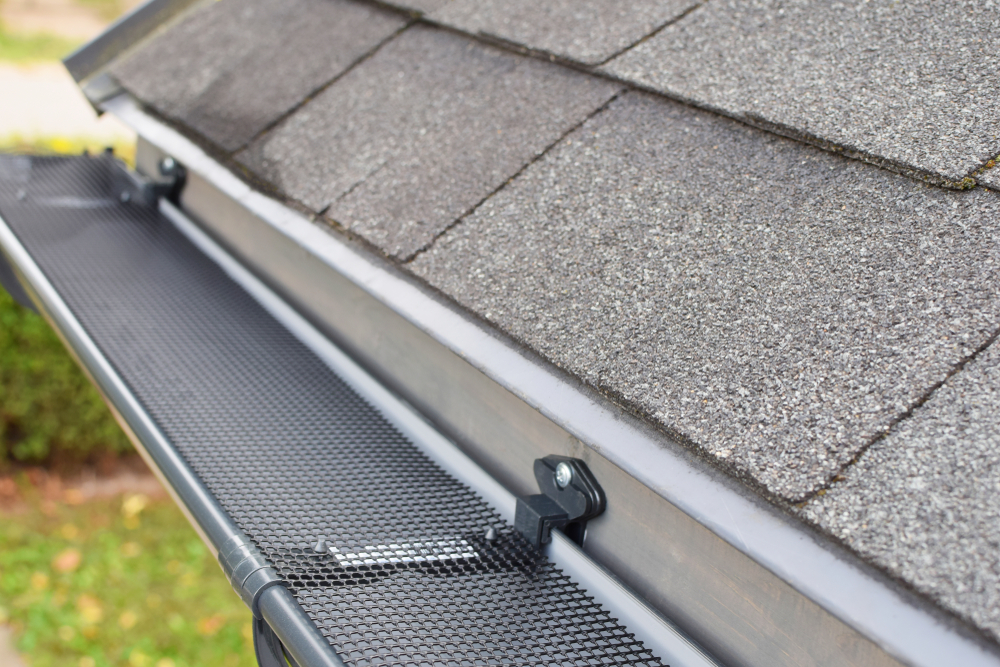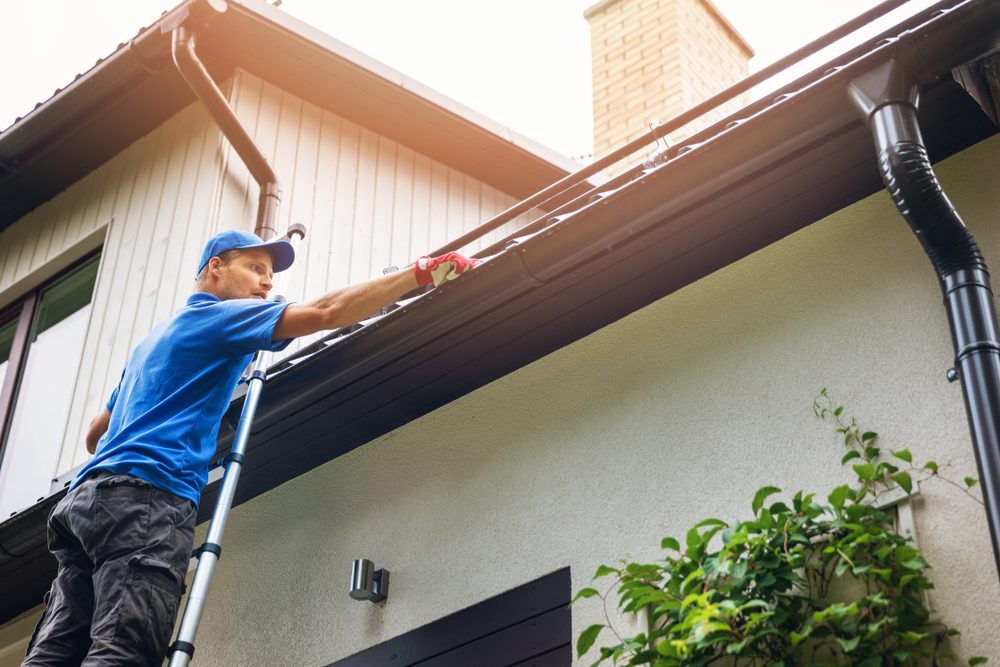Did you know that gutters need to be cleaned out at least 1-2 times per year? This cleaning helps ensure that debris doesn’t pile up and clog the piping. Clogged gutters can lead to pricey consequences such as roof leaks and water damage.
There is, however, a way to reduce the amount of maintenance required to keep your gutters clean.
In case you’ve never heard of them, gutter guards are a protective barrier that can be installed over a gutter, shielding it from the environment. The goal of this is to prevent leaves, sticks, stones, and other debris from entering your gutters. This way, you can go longer between maintenance cleanings.
Today we’re going to talk through the ins and outs of selecting and installing gutter guards.
First, let’s start with some basics.
What Are Gutter Guards?
In short, gutter guards are screens that keep large debris from clogging your roof’s gutters. These guards typically look like thin grates placed over your gutters. Ideally, a good gutter guard has holes that are large enough to allow water to flow freely, while still being small enough to keep leaves, sticks, and other trash out.
Best Gutter Guards
Choosing the best gutter guard for your home involves a variety of considerations such as budget, roof size, environment, and your purpose for installing gutter guards.
Types Of Gutter Guards
Here we’ve compiled a list of the most common types of gutter guards. Each of these categories has its own pros and cons. The best thing to do is consider your home’s needs and select a gutter guard that will suit your specific situation.
Screen – One of the most common types of gutter guards is a regular screen (aka “perforated” gutter guard). They’re the most basic gutter guard, featuring simple metal sheeting with holes punctured throughout. These types of guards are very easy to install and are generally on the lower end of the cost spectrum.
Mesh – As you can guess, a mesh guard features numerous teeny-tiny holes that only allow water through. Unlike screens, these gutter guards are likely to keep almost all debris out. They do tend to be a bit more expensive than other options, however.
Reverse Curve – The most interesting design by far – reverse curve guards function by allowing water to flow over the top curve and down into the gutter. These types of guards usually require professional installation. Unfortunately, this also means that they come with a higher cost of labor.
Brush – Easy to install and affordable, this type of gutter guard is a common choice for DIY jobs. Keep in mind that brush gutter guards are often unable to catch larger debris and require frequent maintenance cleanings.
Foam – Another low-cost option, foam guards are easy to purchase and install, making them a common choice for DIY jobs. Bear in mind, however, that foam guards are one of the least durable types of gutter guard and will likely require replacement after just a few years.
Gutter Guard Installation
Now that we’ve talked about the different types of gutter guards available let’s talk about installation.
Whether or not your gutter guards require professional installation typically depends on the type of guard you purchased. Do a little research before purchasing your gutters and decide whether you want to hire a professional or DIY it.
Keep in mind that although a professional installation may be more expensive, it also allows you to get a more intricate and higher-quality design of the gutter.
Another huge benefit of professional gutter guard installation is being able to rely on the high quality of service. Not only is a roofing specialist more likely to be able to install the guards correctly, but they can also offer a recommendation for your specific needs. Due to this, it’s almost always best to consult with a professional before moving forward with a purchase of gutter guards. You may want to ask for a specific type of gutter, brand, and whether or not you need one at all.
Gutter Guard Cost
The exact cost of your gutter guards can vary depending on a variety of factors. Here are some things that can impact the price:
Type of gutter guard. Generally speaking, simple gutter guards such as foam or screen ones are significantly cheaper than micro-mesh or reverse-curve types.
Professional or DIY installation. Due to labor costs, hiring a professional is typically more expensive than DIYing the installation. Keep in mind that some gutter guards require a professional installation due to how intricate they are.
Length of your gutter. Since gutter guards are typically priced per foot, the exact cost of your installation can vary a lot depending on the length of your gutter.
Answers to Common Questions
We hope that this guide helped answer some of your questions. We’ve also included a few last FAQs below, but feel free to reach out to us if you have any more questions.

How To Install Gutter Guards?
There are two primary ways to install gutter guards – hiring a professional and DIYing it. If your gutter guards are easy to purchase and install, you might be able to install them yourself. For example, foam or brush guards are known for being particularly easy to install. Else, something that can simply be placed on top of your gutter is a decent option for a DIY job.
A more complicated guard, such as a “reverse curve,” however, will likely require professional installation.
How Much Do Gutter Guards Cost?
According to Angi, the average cost to install gutter guards is about $1,300.
Do Gutter Guards Work?
The short answer is that gutter guards work to an extent. Some debris will inevitably end up bypassing your gutter guards, but it will help keep the majority of it out.
Are Gutter Guards Worth It?
This depends on a variety of factors – including how often you’re forced to clean your gutters, the cost of installing gutters in your area, and how hard it is to simply clean your gutters regularly. The best thing to do is to conduct a cost comparison between gutter cleanings and gutter guard installation.
Keep in mind that homes in forested areas with lots of foliage are likely to benefit more from a gutter guard installation. Also, don’t forget to factor in both material and labor costs related to the guard installation.
What Is The Average Cost Of Leaf Filter Gutter Guards?
According to Angi, “LeafFilter costs start at $12 per linear foot”. This is at least a few dollars more expensive per linear foot than standard gutter guards.
What Are The Best Gutter Guards?
There isn’t exactly one gutter guard that’s better than all the rest. It’s more of a process of looking at your budget and needs. It may be helpful to look at some recommendations. For example, here is the 2022 review of gutter guards by “This Old House.”
Do Gutter Guards Cause Ice Dams?
No. Ice dams are created when water freezes and builds up along the edges of your roof. This is often caused by debris building up and clogging gutters, but it is not directly caused by gutter guards. On the contrary, good gutter guards can prevent your gutters from getting clogged and improve water flow.
Looking For A Roofing Expert In The Tennessee Area?
Here at Austermiller, we would love to give you a hand with all of your roofing needs. We offer a variety of services such as roof repair and replacement, mold detection, mold removal, and much more. The best part is that our team can provide services for not only your home but your business as well.
Not only that, but we make sure that each service is carried out with the utmost respect to your property. Unlike other roofing companies, we try our best to leave your property spotless.
We provide roofing services all across Tennessee, so whether you live in Nashville, Mt. Juliet, or Green Hill, we’ve got you covered. Simply give us a call or fill out our online form to contact us, and we’ll get back to you as soon as possible.
Still have questions? Check out our general F.A.Q.


